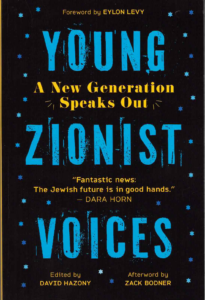Young Zionist Voices: A New Generation Speaks Out edited by David Hazony; New York: Post Hill Press; © 2024; ISBN 9798888-456170; 260 pages; $18.51.

 SAN DIEGO – College students and youth in their 20’s contributed 31 essays to this anthology. Some essays are descriptive like that of Stanford University student Julia Steinberg’s “Home, Transcendence, and the Land,” in which she describes the feelings of belonging and of being home on her first visit to Israel.
SAN DIEGO – College students and youth in their 20’s contributed 31 essays to this anthology. Some essays are descriptive like that of Stanford University student Julia Steinberg’s “Home, Transcendence, and the Land,” in which she describes the feelings of belonging and of being home on her first visit to Israel.
Others were proscriptive such as Ashira Boxman’s “To Stand United, We Must Respect Our Different Paths,” and Kivi Franks’ “Stop Overfocusing on Antisemitism.” Boxman, at the time of writing, was a rabbinic intern at the Larchmont Temple and Franks was a student at Monash University in Melbourne, Australia.
Boxman, a Hebrew Union College fifth-year student, said the Reform movement emphasizes tikkun olam, but it should also emphasize Jewish peoplehood. Franks said Jews should advocate for Israel and Zionism rather than against antisemitism. In other words, be positively for something, rather than against something.
Oliver Anisfeld, an entrepreneur who set up J-TV on YouTube, writes in “Embrace Chosenness” that Jews should promote philosemitism rather than advocating anti-antisemitism. He says Judaism has much to teach other people in the world.
Eli Ackerman Himelfarb in “Youth Movements and the Power of the Madrich” urges the Jewish establishment to fund Jewish youth movements. Rabbinic student Ofer Chizlik, in his essay “Does Liberal Judaism Have a Future?” argues that to remain relevant American Jewry needs to embrace Israel, the Jewish people and the Hebrew language.
On the other hand, Oz Bin Nun, a shaliach at the University of Wisconsin, in his essay “Why Mordecai M. Kaplan Matters After October 7,” wrote “There can be no hope for the Jewish people unless we learn to stand together against the onslaught—and we cannot do that without Jewish solidarity.” To that end, he says, “We must let go of the illusion that Israel is the main actor, and American Jewry is a supporting actor. American Jewry must reconstitute itself as a cultural and political community, to speak its mind, to take responsibility for its brothers and sisters, and to develop a profound and important dialogue with Israeli Jewry.”
Tracy Frydberg, dialogue director at ANU – Israel’s Museum of the Jewish People, in the essay “The Jewish Family Comes First,” suggests history for Israelis goes from the Tanach to the Palmach, with little consideration for our people’s experience in the Diaspora. She says the building of Jewish identity has been outsourced to the Birthright Program, whereas it should be at the Shabbat table.
Noah Katz, who chairs Britain’s Jewish “Board of Deputies’ Under 35 Assembly,” in his essay, “It’s Time for the Grown-Ups to Step Aside,” asks “Am I a Zionist?” and answers as follows: “That depends on how one defines Zionism. If Zionism is just believing in the right for Jewish self-determination in our ancestral homeland – then sure as shit, I’m a Zionist. I know that Israel is one of the only places in the world, where it is safe for Jews to exist as Jews. If, however, Zionism means that one isn’t allowed to criticize or actively campaign against the Israeli government or establishment—then, no, I’m not a Zionist.”
Reading these essays will assure you that the younger generation doesn’t always agree on what course the global Jewish community must take, and in that, it is similar to all the generations before it. You’ll also be assured that the younger generation thinks deeply and passionately about the Jewish future, and that, in itself, is reassuring.
*
Donald H. Harrison is publisher and editor of San Diego Jewish World.